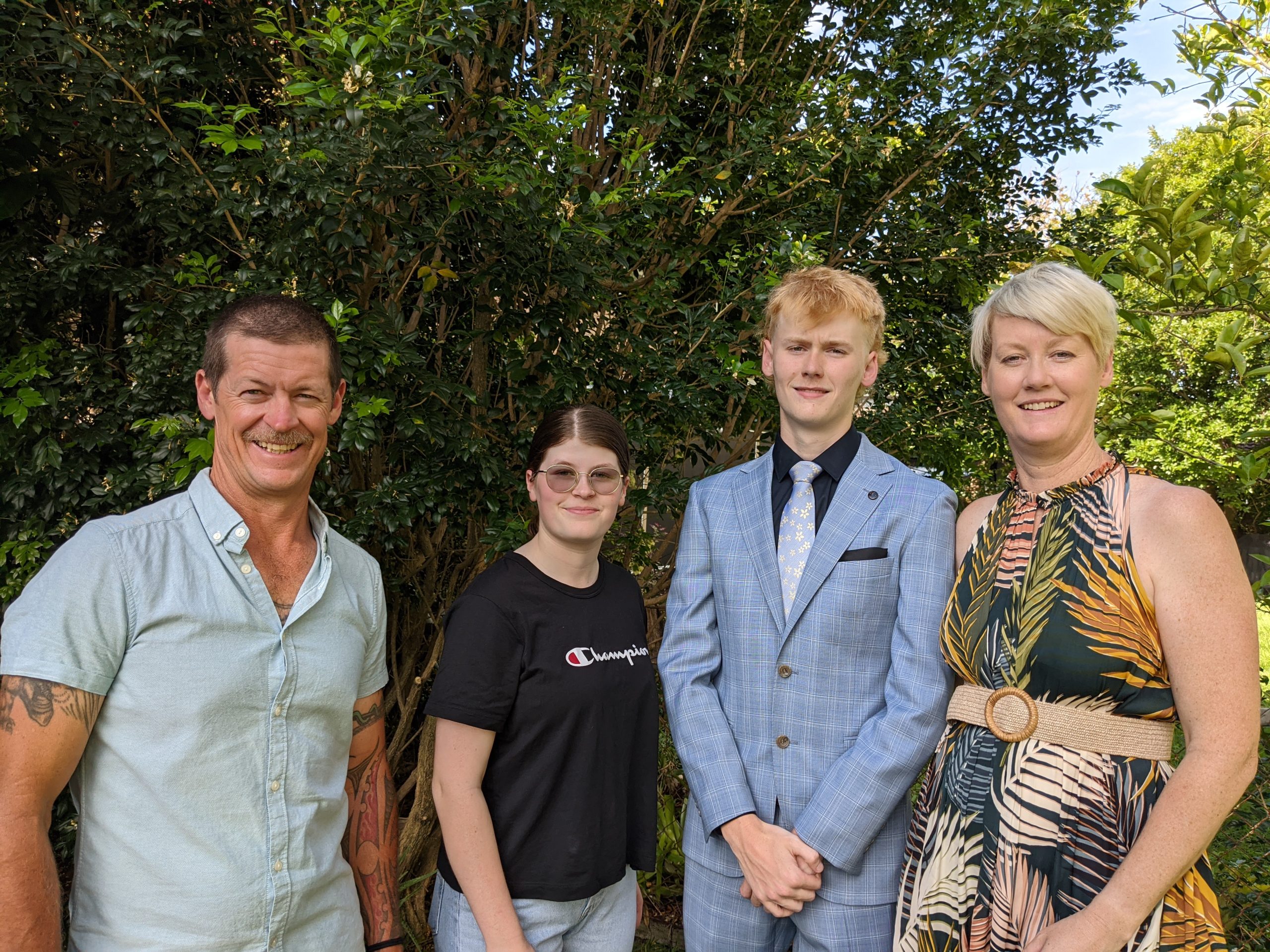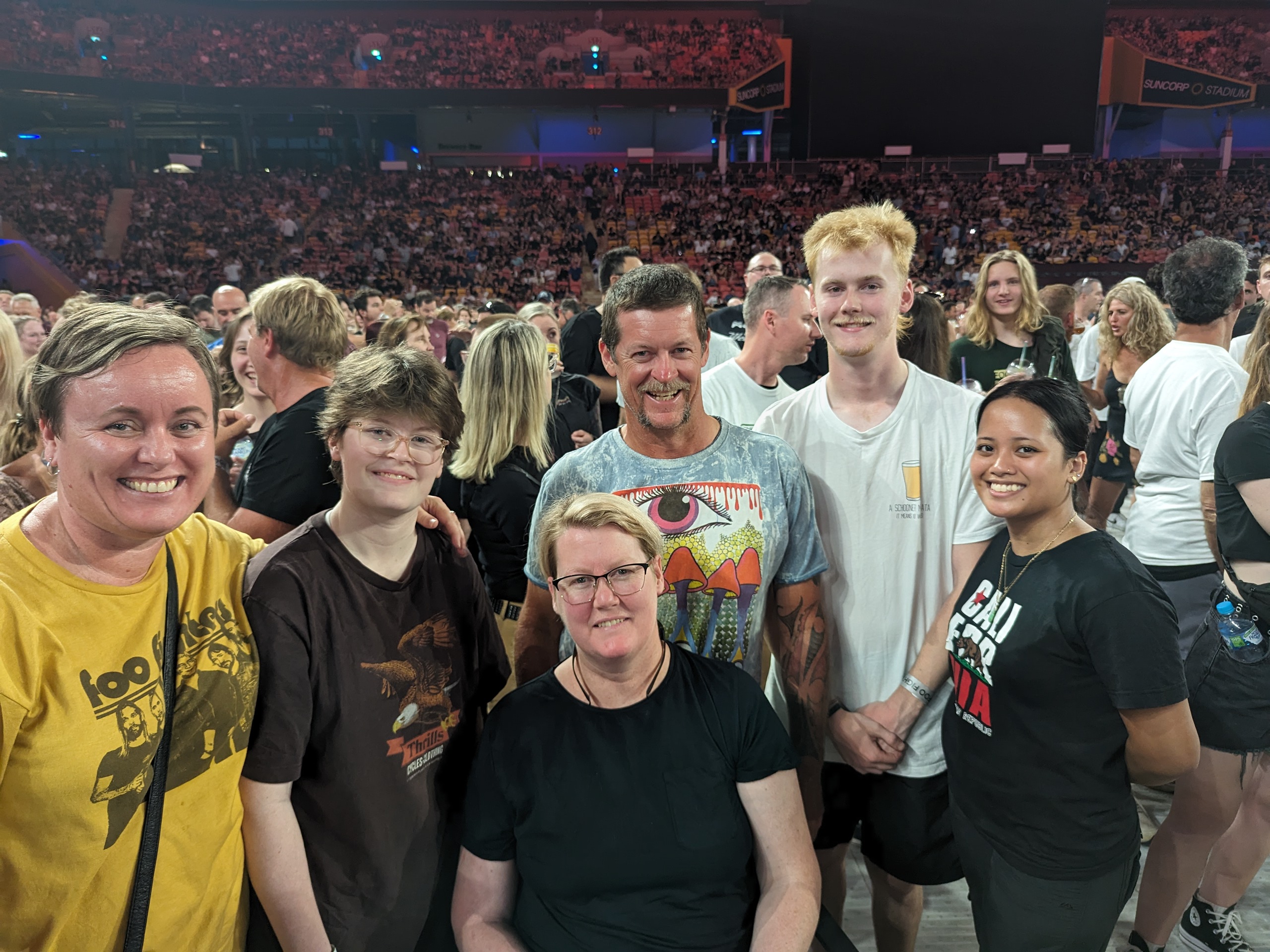07 Mar Life after Brain Tumour
A brain tumour is an abnormal growth of cells in or near brain tissue. Some tumours are slow-growing and benign (non-cancerous), while cancerous (or malignant) tumours grow more rapidly and are more likely to come back. Both types of brain tumour can be very dangerous – even a ‘benign’ tumour could be life threatening depending on the location.
Kylie McKiernan was diagnosed with two brain tumours in 2021. Thankfully, they were able to be treated with radiation therapy, but she is still living with long-term complications following the treatment. She spoke to us about her experience, the unexpected challenges she faced, and what she wishes people knew about brain tumours.
Brain Foundation: Can you tell us a bit about yourself?
Kylie McKiernan: I was 43 when I was first diagnosed. I was very active – I was working full time, hiking, going to the gym, watching bands and going out with friends. I have, now, two adult children (20 and 18) and I’m married to my rock.
BF: How did you first find out you had a brain tumour?
KM: I used to go to the gym around 6-7 times a week and I had a small limp. At the time I thought it was muscle fatigue. I then started getting dizzy spells a few days later, so I went to a hospital and waited over 4 hours. I started to feel better so I left. Then, a few days later I woke up and my right eye was blurry. It was Easter morning, 2021. I ended up going to Greenslopes Private emergency and they had me doing an MRI within 10 minutes… Then unfortunately, I got the bad news. I had two brain tumours, and a big one was in my brainstem, which meant it was inoperable. At the time, we thought I had weeks to go and I had a specialist team within the hour trying to figure out what to do.

BF: That must have been quite a shock to hear the tumour was inoperable. Are there other treatments or therapies available?
KM: I ended up having radiation therapy the following week for 5 days. Because the brainstem is so small, I ended up becoming quite weak and losing a lot of function on my right side. Unfortunately whilst the radiation got rid of the tumours, I ended up with radiation necrosis. I was on steroids for 12 months for the radiation necrosis, but I had severe side effects and ended up with Cushing’s Syndrome. Then they tried a new drug on the PBS called Avastin to replace the steroids. I’m currently on Avastin which is helping with the radiation necrosis, and having regular MRIs and PET scans for now. No other tumours or cancer have shown up thankfully!
What is radiation necrosis?
Radiation necrosis is the death of healthy tissue caused by radiation therapy. It is a rare side effect of radiation therapy given to kill cancer cells, and can occur months or even years after cancer treatment has ended. It can affect soft tissue, bone, or brain tissue, and develops when blood supply to the area is disrupted.
BF: How has this impacted or changed your life? Is there anything in particular that has helped you manage these impacts?
KM: It has changed my life and turned it upside down. I went from being a person with an active lifestyle who loved her work, but now I can no longer do the work that I used to do. I was pretty high up and worked in IT, and had started my dream job two weeks before my diagnosis. I couldn’t work there anymore as I couldn’t remember much, so I have recently gone back to my long term employer who I was with for 17 years. I’m only doing basic admin work for 3 hours at a time. That’s all I can handle. Because I’m in a walker around the house and use a wheelchair when out and about, I can’t get to the Brisbane office, so I work from home.
I think it’s important that people know what brain tumours can do. I had no idea that I could lose so much functionality - it might have been my naivety but maybe if I had known, I would have been more prepared.
I can’t drive either, so I need NDIS/support if I need to go anywhere. I’ve found out it’s quite hard when you lose most of the functionality on one side of your body. I’m very slow at things and pretty much sit and watch TV. I can no longer write as I was right handed before and that’s the side I can no longer utilise. You quickly realise a lot of disabled tools are for two handed people and not just one. I used to cook as well and travel but now I can’t cut things up because you need two hands, and for travel you have to book disabled rooms etc well in advance. It’s not easy but I try to keep a positive viewpoint, I talk to people and have a therapist. The first 12 months were very hard but I’ve been learning and adjusting since then.

BF: What do you wish people knew about brain tumours? Is there anything that you would like to see from the community / wider society so that we can better support people with brain tumours?
KM: I think it’s important that people know what brain tumours can do. I had no idea that I could lose so much functionality – it might have been my naivety but maybe if I had known, I would have been more prepared. Also, the doctors assume it is a specific type of brain tumour but they can’t be 100% sure, which is quite frustrating. I didn’t know that you could be “undiagnosed” (beyond the general diagnosis of ‘brain tumour’).
I feel like I am alone as I don’t know anyone else like me. I have spent some time in rehab trying to learn the new me and whilst it was good, I found that most people are recovering from knee or hip replacements. My husband and kids have been a huge support. Early after my diagnosis, I was cranky (mainly from the steroids), but they have been a huge support. I don’t know what I would do without them. And I’ve finally found good quality NDIS Support. It’s so hard to find good support, so it’s such a relief to finally have this.
Further information and support
Thank you Kylie for sharing your story and helping to raise awareness for the impacts of brain tumours.
Here are some other links and resources related to Kylie’s story:
- Donate to brain research
- Brain tumour – overview article
- Other patient stories
- Share your story – fill out this form if you are interested in sharing your story
- Brain Tumour Alliance Australia – a national organisation focused on supporting brain tumour patients, their carers and families.


 The Brain Foundation is the largest, independent funder of brain and spinal injury research in Australia. We believe research is the pathway to recovery.
The Brain Foundation is the largest, independent funder of brain and spinal injury research in Australia. We believe research is the pathway to recovery.